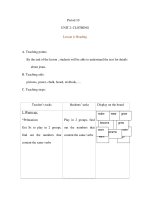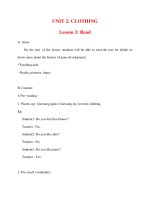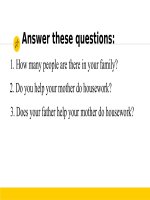Unit 10 Ecotourism Lesson 3 Reading
Bạn đang xem bản rút gọn của tài liệu. Xem và tải ngay bản đầy đủ của tài liệu tại đây (129.18 KB, 4 trang )
Preparing date: April 9th, 2018
Class: 10C9
Student Teacher: Vu Thi My Hanh
Teacher: Phạm Thi Lan Oanh
Teaching date: April 12 th, 2018
Period:
UNIT 10: ECOTOURISM
Lesson 3: READING
I/ Objectives:
By the end of the lesson, students will be able to:
1. Knowledge: (3 basic levels: recognition, comprehension, application).
- Vocabulary: read, write, and understand key words or phrases related to
preserving the environment.
- Language: use structure, vocabulary to do task required.
2. Skills:
- Read for general ideas and for specific information about threats to
ecotourism and do tasks.
- Skimming and scanning reading
3. Attitude and competence:
- Have a positive attitude towards what they have learnt.
- Understand and actively respond to relevant matters or situations.
II/ Preparations:
- Teacher: Handouts, textbook, pieces of papers.
- Students: Textbook.
III/ Anticipated problems and solutions:
- Ss may not be used to the way of reading and doing the tasks.
- So prepare and explain carefully before asking them to do.
IV/ Procedures:
Teacher’s and students’ activities
Board display
1. Warm up (5 minutes)
Key:
-T shows a video, asks Ss take note
1. City
that they see.
2. Tours
- After 2 minutes, Ss go to the board
3. Beaches
and write down their answers.
4. Rain forests
5. Cloud forests
2. New lesson
UNIT 10: ECOTORISM
Activity 1 (5 minutes)
Lesson 3: Reading
- T shows a video, asks Ss to take note
that they see and go to the board to
write down.
- T asks Ss to look at the map page 51
and compare what they see in the
video.
- Ss watch, listen, take note and answer
the questions.
Activity 1:
Suggested answers: Tourists can swim in the sea,
visit marine national parks, see the volcanoes,
watch the monkeys in national parks, etc.
Activity 2: (5 minutes)
* Vocabulary:
+ discharge (v) /dɪsˈtʃɑːdʒ/: thải ra
+ rapidly /ˈræpɪdli/ = quickly
+ fauna (n) /ˈfɔːnə/: quần động vật
+ flora (n) /ˈflɔːrə/: quần thực vật
+ brochure (n) /ˈbrəʊʃə(r)/ sách nhỏ
thông tin
+ destination (n) /ˌdestɪˈneɪʃn/: nơi đến
+ exotic (adj) /ɪɡˈzɒtɪk/: đẹp kì lạ, từ
nước ngồi đưa vào
+ adapt (v) /əˈdỉpt/: sửa lại cho phù
hợp, thích nghi
+ pros = advantages
cons = disadvantages
- Ss listen and take note.
- T asks Ss listen and repeat 2.
* Read and choose the best title
- T asks Ss to read the two opinions
quickly and find the main idea of each
opinion.
- T has Ss choose the best title for the
text from the three options.
- Ss listen, read and do activity 2.
Activity 3: (7 minutes)
- T asks Ss to read the text again and
underline the five words from activity
3.
- T allows enough time for Ss to skim
the paragraphs quickly and do activity
3.
- Ss listen, do activity 2 and answer the
question.
- Let’s check the answers.
Activity 2:
* Vocabulary:
+ discharge (v) /dɪsˈtʃɑːdʒ/: thải ra
+ rapidly /ˈræpɪdli/ = quickly
+ fauna (n) /ˈfɔːnə/: quần động vật
+ flora (n) /ˈflɔːrə/: quần thực vật
+ brochure (n) /ˈbrəʊʃə(r)/ sách nhỏ thông tin
+ destination (n) /ˌdestɪˈneɪʃn/: nơi đến
+ exotic (adj) /ɪɡˈzɒtɪk/: đẹp kì lạ, từ nước ngồi
đưa vào
+ adapt (v) /əˈdỉpt/: sửa lại cho phù hợp, thích
nghi
+ pros = advantages
cons = disadvantages
* Read and choose the best title:
- Answer: B
Activity 3:
1. e 2.c 3.a
Activity 4:
4. b
5.d
Activity 4: (5 minutes)
- T asks Ss to work in pair and list the
positive and negative effects of
ecotourism mentioned by the two
speakers.
- Ss listen and do activity 3.
Activity 5: (10 minutes)
- T explains Ss how to do the Activity
5: Read each statement, underline key
words and then scan Marco’s and
Pablo’s opinions to find similar ideas
or synonyms.
- Ss listen and do activity 5.
Activity 6: (8 minutes)
- T asks Ss to discuss in group of 3 or
4.
- T asks Ss some guiding questions
before they start their discussion: What
do tourists need when they visit a
place? What do local people do to
provide good services for tourists
(such as food, water and vehicles)
- Ss listen and do activity 5.
3. Consolidation: (2 minutes)
- T asks Ss: What have you learnt
today? What can you do now?
- T summarizes the main points of the
- Positive effects: more money for the local
government to preserve nature; tourists’
awareness of how to protect the environment;
more jobs and higher income for local people.
- Negative effect: changing local people’s way of
life
Activity 5:
1. Marco and Pablo (Marco: They [Tourists] stay
with local families; Pablo: There are more jobs
for us…)
2. Marco (I think ecotourism can help to solve
this problem…)
3. Pablo (To entertain tourists, we have to change
our usual foods to suit their tastes and adapt
dances and traditions to suit their needs.)
4. Marco (More and more hotels are built while
forests and beaches are destroyed.)
5. Marco (Tour guides and travel brochures
educate tourists about the protection of the
environment.)
6. Pablo (I don’t really know what it is.)
7. Marco (Marco gave examples of sustainable
ecotourism and its benefits)
Activity 6:
Suggested answers:
To some extent, the answer is yes. The money
from ecotourists may be used to preserve nature.
However, the local people have to use up their
resource (such as energy sources, food and
water) to provide good service for tourist. More
tourists mean more vehicles, more water and
food consumption, and more waste. Even though
the discharge of waste and consumption of
nature resources by tourists are minimised, air,
water and noise pollution is unavoidable.
lesson.
- Today, we are studying about pros of
ecotourism.
pros: helping to solve environment
pollutions. ( forests and beaches are
destroyed)...
4. Homework: (1 minute)
- T asks Ss to make the sentences with
given words.
- Prepare for the next lesson.
* Feedback:
.....................................................................................................................................
.....................................................................................................................................
.....................................................................................................................................
.....................................................................................................................................
.....................................................................................................................................
Tiên Lãng, ngày tháng năm 2018
Phê duyệt của giáo viên hướng dẫn
Người lập kế hoạch
Phạm Thị Lan Oanh
Vũ Thị Mỹ Hạnh









